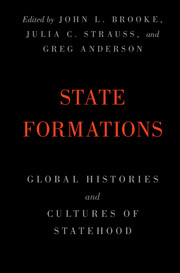Book contents
- State Formations
- State Formations
- Copyright page
- Dedication
- Contents
- Figures and Maps
- Tables
- Contributors
- Preface
- Acknowledgments
- Introduction
- Part I Definitions
- Part II Foundings
- Part III Agendas
- Part IV Memberships
- 16 The Mesopotamian Citizen Conceptualized
- 17 Military Mobilization and the Experience of Living with the Ming State
- 18 Ethnicity and Power in Early Modern Europe and Asia
- 19 Patriliny and Modern States in the Middle East
- 20 Social Service, Convivialismo, and Hegemony in Colombia
- 21 Indian Affirmative Action and the Postcolonial State
- Conclusion
- Index
20 - Social Service, Convivialismo, and Hegemony in Colombia
from Part IV - Memberships
Published online by Cambridge University Press: 23 March 2018
- State Formations
- State Formations
- Copyright page
- Dedication
- Contents
- Figures and Maps
- Tables
- Contributors
- Preface
- Acknowledgments
- Introduction
- Part I Definitions
- Part II Foundings
- Part III Agendas
- Part IV Memberships
- 16 The Mesopotamian Citizen Conceptualized
- 17 Military Mobilization and the Experience of Living with the Ming State
- 18 Ethnicity and Power in Early Modern Europe and Asia
- 19 Patriliny and Modern States in the Middle East
- 20 Social Service, Convivialismo, and Hegemony in Colombia
- 21 Indian Affirmative Action and the Postcolonial State
- Conclusion
- Index
Summary
- Type
- Chapter
- Information
- State FormationsGlobal Histories and Cultures of Statehood, pp. 317 - 330Publisher: Cambridge University PressPrint publication year: 2018
- 1
- Cited by



